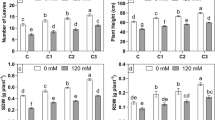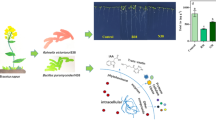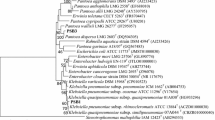Abstract
Main Conclusion
The consortium inoculation with strains R1 and R4 modified the root system to boost seedling growth, increase the zinc content of French bean pods, and reduce salinity stress.
Abstract
The present study demonstrated the effect of two 1-aminocyclopropane-1-carboxylic acid (ACC) deaminase-producing plant growth-promoting rhizobacteria (Pantoea agglomerans R1 and Pseudomonas fragi R4) alone and consortia on the root system development, French bean growth, and zinc content as well as salinity stress tolerance. Both the strains were characterized for ACC utilization activity (426.23 and 380.54 nmol α-ketobutyrate mg protein−1 h−1), indole acetic acid (IAA) production, phosphate solubilization, ammonia, hydrogen cyanide (HCN), and siderophore production. The strains exhibited zinc solubilization in both plate and broth assays with zinc oxide and zinc carbonate as zinc sources as validated by atomic absorption spectroscopy (AAS). Single or combined inoculations with the selected strains significantly modulated the architectural and morphological traits of the root system of French bean plants. Furthermore, the application of R1and R4 consortia has enhanced zinc content in roots (60.83 mg kg−1), shoots (15.41 mg kg−1), and pods (30.04 mg kg−1) of French bean plants grown in ZnCO3 amended soil. In another set of pot experiments, the consortium bacterization has significantly enhanced length as well as fresh and dry biomass of roots and shoots of the French bean plant under saline stress conditions. Additionally, inoculation with ACC-degrading rhizobacterial strains has increased chlorophyll and carotenoid contents, osmoprotectant content, and antioxidative enzyme (catalase and peroxidase) activity in comparison to their counterparts exposed to salt treatments only. Current findings suggested ACC deaminase-producing rhizobacterial strains hold the potential to improve root architecture which in turn promotes plant growth under salt-stressed conditions as well as enhances micronutrient concentration in host plants.










Similar content being viewed by others
Data availability
All data supporting the findings of this study are available within the paper and its Supplementary Information. The 16S rRNA gene sequence data were deposited in the NCBI GenBank database under the accession number MT250923 and MT250924 and are available at the following URL: https://www.ncbi.nlm.nih.gov/.
Abbreviations
- ACC:
-
1-Aminocyclopropane-1-carboxylic acid
- PGPR:
-
Plant growth-promoting rhizobacteria
- AAS:
-
Atomic absorption spectroscopy
- ROS:
-
Reactive oxygen species
- MDA:
-
Malondialdehyde
- DF:
-
Dworkin and Foster
- CAT:
-
Catalase
- POD:
-
Peroxidase
- CAS:
-
Chrome Azurol S
References
Ahmad F, Ahmad I, Khan MS (2008) Screening of free-living rhizospheric bacteria for their multiple plant growth promoting activities. Microbiol Res 163(2):173–181. https://doi.org/10.1016/j.micres.2006.04.001
Ali L, Shaheen MR, Ihsan MZ, Masood S, Zubair M, Shehzad F, Khalid A-U-H (2022) Growth, photosynthesis and antioxidant enzyme modulations in broccoli (Brassica oleracea L. var. italica) under salinity stress. S Afr J Bot 148:104–111. https://doi.org/10.1016/j.sajb.2022.03.050
Arnon DI (1949) Copper enzymes in isolated chloroplasts: Polyphenoloxidase in Beta vulgaris. Plant Physiol 24(1):1–15. https://doi.org/10.1104/pp.24.1.1
Ayaz M, Ali Q, Jiang Q, Wang R, Wang Z, Mu G, Khan SA, Khan AR, Manghwar H, Wu H, Gao X, Gu Q (2022) Salt tolerant Bacillus strains improve plant growth traits and regulation of phytohormones in wheat under salinity stress. Plants 11(20):2769
Bakker AW, Schippers B (1987) Microbial cyanide production in the rhizosphere in relation to potato yield reduction and Pseudomonas SPP-mediated plant growth-stimulation. Soil Biol Biochem 19(4):451–457. https://doi.org/10.1016/0038-0717(87)90037-X
Bates LS, Waldren RP, Teare ID (1973) Rapid determination of free proline for water-stress studies. Plant Soil 39(1):205–207. https://doi.org/10.1007/BF00018060
Batista BD, Dourado MN, Figueredo EF, Hortencio RO, Marques JPR, Piotto FA, Bonatelli ML, Settles ML, Azevedo JL, Quecine MC (2021) The auxin-producing Bacillus thuringiensis RZ2MS9 promotes the growth and modifies the root architecture of tomato (Solanum lycopersicum cv. Micro-Tom). Arch Microbiol 203(7):3869–3882. https://doi.org/10.1007/s00203-021-02361-z
Beers RF, Sizer IW (1952) A spectrophotometric method for measuring the breakdown of hydrogen peroxide by catalase. J Biol Chem 195(1):133–140. https://doi.org/10.1016/S0021-9258(19)50881-X
Beveridge TJ (2001) Use of the Gram stain in microbiology. Biotech Histochem 76:111–118. https://doi.org/10.1080/714028139
Bharti N, Pandey SS, Barnawal D, Patel VK, Kalra A (2016) Plant growth promoting rhizobacteria Dietzia natronolimnaea modulates the expression of stress-responsive genes providing protection of wheat from salinity stress. Sci Rep 6(1):1–16. https://doi.org/10.1038/srep34768
Bradford MM (1976) A rapid and sensitive method for the quantitation of microgram quantities of protein utilizing the principle of protein-dye binding. Anal Biochem 72(1):248–254. https://doi.org/10.1006/abio.1976.9999
Breś W, Kleiber T, Markiewicz B, Mieloszyk E, Mieloch M (2022) The effect of NaCl stress on the response of lettuce (Lactuca sativa L.). Agronomy 12(2):244. https://doi.org/10.3390/agronomy12020244
Checchio MV, de Cássia AR, de Oliveira KR, Moro GV, Santos DMMD, Gratão PL (2021) Enhancement of salt tolerance in corn using Azospirillum brasilense: an approach on antioxidant systems. J Plant Res 134(6):1279–1289. https://doi.org/10.1007/s10265-021-01332-1
Chen T-C, Chou S-Y, Chen M-C, Lin J-S (2022) IbTLD modulates reactive oxygen species scavenging and DNA protection to confer salinity stress tolerance in tobacco. Plant Sci 323:111415. https://doi.org/10.1016/j.plantsci.2022.111415
Comas L, Becker S, Cruz VM, Byrne PF, Dierig DA (2013) Root traits contributing to plant productivity under drought. Front Plant Sci 4:442. https://doi.org/10.3389/fpls.2013.00442
Desoky E-SM, Saad AM, El-Saadony MT, Merwad A-RM, Rady MM (2020) Plant growth-promoting rhizobacteria: Potential improvement in antioxidant defense system and suppression of oxidative stress for alleviating salinity stress in Triticum aestivum (L.) plants. Biocatalysis Agric Biotechnol 30:101878. https://doi.org/10.1016/j.bcab.2020.101878
Dhokne K, Pandey J, Yadav RM, Ramachandran P, Rath JR, Subramanyam R (2022) Change in the photochemical and structural organization of thylakoids from pea (Pisum sativum) under salt stress. Plant Physiol Biochem 177:46–60. https://doi.org/10.1016/j.plaphy.2022.02.004
Din BU, Sarfraz S, Xia Y, Kamran MA, Javed MT, Sultan T, Munis MFH, Chaudhary HJ (2019) Mechanistic elucidation of germination potential and growth of wheat inoculated with exopolysaccharide and ACC-deaminase producing Bacillus strains under induced salinity stress. Ecotoxicol Environ Saf 183:109466. https://doi.org/10.1016/j.ecoenv.2019.109466
Dinesh R, Srinivasan V, Hamza S, Sarathambal C, Gowda SA, Ganeshamurthy A, Gupta S, Nair VA, Subila K, Lijina A (2018) Isolation and characterization of potential Zn solubilizing bacteria from soil and its effects on soil Zn release rates, soil available Zn and plant Zn content. Geoderma 321:173–186
Egamberdieva D, Wirth S, Bellingrath-Kimura SD, Mishra J, Arora NK (2019) Salt-tolerant plant growth promoting rhizobacteria for enhancing crop productivity of saline soils. Front Microbiol 10:2791. https://doi.org/10.3389/fmicb.2019.02791
Fasim F, Ahmed N, Parsons R, Gadd GM (2002) Solubilization of zinc salts by a bacterium isolated from the air environment of a tannery. FEMS Microb Lett 213(1):1–6. https://doi.org/10.1016/S0378-1097(02)00725-5
Fiske CH, Subbarow Y (1925) The colorimetric determination of phosphorus. J Biol Chem 66(2):375–400. https://doi.org/10.1016/S0021-9258(18)84756-1
Gang S, Saraf M, Waite CJ, Buck M, Schumacher J (2018) Mutualism between Klebsiella SGM 81 and Dianthus caryophyllus in modulating root plasticity and rhizospheric bacterial density. Plant Soil 424(1):273–288. https://doi.org/10.1007/s11104-017-3440-5
Gordon SA, Weber RP (1951) Colorimetric estimation of indoleacetic acid. Plant Physiol 26(1):192–195. https://doi.org/10.1104/pp.26.1.192
Gupta S, Pandey S (2019a) Unravelling the biochemistry and genetics of ACC deaminase-An enzyme alleviating the biotic and abiotic stress in plants. Plant Gene 18:100175. https://doi.org/10.1016/j.plgene.2019.100175
Gupta S, Pandey S (2019b) ACC deaminase producing bacteria with multifarious plant growth promoting traits alleviates salinity stress in french bean (Phaseolus vulgaris) plants. Front Microbiol 10:1506. https://doi.org/10.3389/fmicb.2019.01506
Gupta A, Bano A, Rai S, Kumar M, Ali J, Sharma S, Pathak N (2021) ACC deaminase producing plant growth promoting rhizobacteria enhance salinity stress tolerance in Pisum sativum. 3 Biotech 11(12):514. https://doi.org/10.1007/s13205-021-03047-5
Habib SH, Kausar H, Saud HM (2016) Plant growth-promoting rhizobacteria enhance salinity stress tolerance in Okra through ROS-scavenging enzymes. Biomed Res Int 2016:6284547. https://doi.org/10.1155/2016/6284547
Ha-Tran DM, Nguyen TT, Hung S-H, Huang E, Huang C-C (2021) Roles of plant growth-promoting rhizobacteria (PGPR) in stimulating salinity stress defense in plants: A review. Int J Mol Sci 22(6):3154. https://doi.org/10.3390/ijms22063154
Henriques AR, Chalfun-Junior A, Aarts M (2012) Strategies to increase zinc deficiency tolerance and homeostasis in plants. Braz J Plant Physiol 24:3–8
Hodges DM, DeLong JM, Forney CF, Prange RK (1999) Improving the thiobarbituric acid-reactive-substances assay for estimating lipid peroxidation in plant tissues containing anthocyanin and other interfering compounds. Planta 207(4):604–611. https://doi.org/10.1007/s004250050524
Honma M, Shimomura T (1978) Metabolism of 1-aminocyclopropane-1-carboxylic acid. Agric Biol Chem 42(10):1825–1831. https://doi.org/10.1080/00021369.1978.10863261
Hsu S-H, Shen M-W, Chen J-C, Lur H-S, Liu C-T (2021) The photosynthetic bacterium Rhodopseudomonas palustris strain PS3 exerts plant growth-promoting effects by stimulating nitrogen uptake and elevating auxin levels in expanding leaves. Front Plant Sci 12:573634. https://doi.org/10.3389/fpls.2021.573634
Hussain A, Arshad M, Zahir ZA, Asghar M (2015) Prospects of zinc solubilizing bacteria for enhancing growth of maize. Pakistan J Agric Sci 52(4):915–922
Idayu Othman NM, Othman R, Saud HM, Wahab PE (2017) Effects of root colonization by zinc-solubilizing bacteria on rice plant (Oryza sativa MR219) growth. Agric Nat Resources 51(6):532–537. https://doi.org/10.1016/j.anres.2018.05.004
Iqbal U, Jamil N, Ali I, Hasnain S (2010) Effect of zinc-phosphate-solubilizing bacterial isolates on growth of Vigna radiata. Ann Microbiol 60(2):243–248
Javed H, Akhtar MJ, Asghar HN, Amer J (2018) Screening of zinc solubilizing bacteria and their potential to increase grain concentration in wheat (Triticum aestivum). Int J Agric Biol 20(3):547–553. https://doi.org/10.17957/IJAB/15.0514
Ji J, Yuan D, Jin C, Wang G, Li X, Guan C (2020) Enhancement of growth and salt tolerance of rice seedlings (Oryza sativa L.) by regulating ethylene production with a novel halotolerant PGPR strain Glutamicibacter sp. YD01 containing ACC deaminase activity. Acta Physiol Plant 42(4):1–17. https://doi.org/10.1007/s11738-020-3034-3
Karnwal A (2021) Pseudomonas spp., a zinc-solubilizing vermicompost bacteria with plant growth-promoting activity moderates zinc biofortification in tomato. Int J Veg Sci 27(4):398–412. https://doi.org/10.1080/19315260.2020.1812143
Kaur T, Devi R, Kumar S, Sheikh I, Kour D, Yadav AN (2022) Microbial consortium with nitrogen fixing and mineral solubilizing attributes for growth of barley (Hordeum vulgare L.). Heliyon 8(4):e09326. https://doi.org/10.1016/j.heliyon.2022.e09326
Kshetri L, Pandey P, Sharma GD (2018) Rhizosphere mediated nutrient management in Allium hookeri Thwaites by using phosphate solubilizing rhizobacteria and tricalcium phosphate amended soil. J Plant Interact 13(1):256–269. https://doi.org/10.1080/17429145.2018.1472307
Kumar K, Amaresan N, Madhuri K (2017) Alleviation of the adverse effect of salinity stress by inoculation of plant growth promoting rhizobacteria isolated from hot humid tropical climate. Ecol Eng 102:361–366
Noulas C, Tziouvalekas M, Karyotis T (2018) Zinc in soils, water and food crops. J Trace Elem Med Biol 49:252–260. https://doi.org/10.1016/j.jtemb.2018.02.009
Pandey S, Singh S, Yadav AN, Nain L, Saxena AK (2013) Phylogenetic diversity and characterization of novel and efficient cellulase producing bacterial isolates from various extreme environments. Biosci Biotechnol Biochem 77(7):1474–1480. https://doi.org/10.1271/bbb.130121
Penrose DM, Glick BR (2003) Methods for isolating and characterizing ACC deaminase-containing plant growth-promoting rhizobacteria. Physiol Plant 118(1):10–15. https://doi.org/10.1034/j.1399-3054.2003.00086.x
Prajapati J, Yadav J, Jaiswal DK, Prajapati B, Tiwari S, Yadav J (2022) Salt tolerant indigenous Zn solubilizing bacteria isolated from forest organic soils promotes yield and root growth in Oryza sativa under zinc deficient alluvial soil. Geomicrobiol J 39(6):465–476. https://doi.org/10.1080/01490451.2022.2028941
Prathap S, Thiyageshwari S, Krishnamoorthy R, Prabhaharan J, Vimalan B, Gopal NO, Anandham R (2022) Role of zinc solubilizing bacteria in enhancing growth and nutrient accumulation in rice plants (Oryza sativa) grown on zinc (Zn) deficient submerged soil. J Soil Sci Plant Nutr 22(1):971–984. https://doi.org/10.1007/s42729-021-00706-7
Ramesh A, Sharma SK, Sharma MP, Yadav N, Joshi OP (2014) Inoculation of zinc solubilizing Bacillus aryabhattai strains for improved growth, mobilization and biofortification of zinc in soybean and wheat cultivated in Vertisols of central India. Appl Soil Ecol 73:87–96
Roy Choudhury A, Choi J, Walitang DI, Trivedi P, Lee Y, Sa T (2021) ACC deaminase and indole acetic acid producing endophytic bacterial co-inoculation improves physiological traits of red pepper (Capsicum annum L.) under salt stress. J Plant Physiol 267:153544. https://doi.org/10.1016/j.jplph.2021.153544
Saadaoui N, Silini A, Cherif-Silini H, Bouket AC, Alenezi FN, Luptakova L, Boulahouat S, Belbahri L (2022) Semi-arid-habitat-adapted plant-growth-promoting rhizobacteria allows efficient wheat growth promotion. Agronomy 12(9):2221
Saravanan VS, Subramoniam SR, Raj S (2004) Assessing in vitro solubilization potential of different zinc solubilizing bacteria (ZSB) isolates. Braz J Microbiol. https://doi.org/10.1590/S1517-83822004000100020
Sarkar A, Ghosh PK, Pramanik K, Mitra S, Soren T, Pandey S, Mondal MH, Maiti TK (2018) A halotolerant Enterobacter sp. displaying ACC deaminase activity promotes rice seedling growth under salt stress. Res Microbiol 169(1):20–32. https://doi.org/10.1016/j.resmic.2017.08.005
Sarker U, Oba S (2018) Drought stress effects on growth, ROS markers, compatible solutes, phenolics, flavonoids, and antioxidant activity in Amaranthus tricolor. Appl Biochem Biotechnol 186(4):999–1016. https://doi.org/10.1007/s12010-018-2784-5
Schwyn B, Neilands JB (1987) Universal chemical assay for the detection and determination of siderophores. Anal Biochem 160(1):47–56. https://doi.org/10.1016/0003-2697(87)90612-9
Shafigh M, Hamidpour M, Abbaszadeh-Dahaji P, Mozafari V, Furrer G (2019) Bioavailability of Zn from layered double hydroxides: The effects of plant growth-promoting rhizobacteria (PGPR). Appl Clay Sci 182:105283. https://doi.org/10.1016/j.clay.2019.105283
Shahid SA, Zaman M, Heng L (2018) Soil salinity: Historical perspectives and a world overview of the problem. In: Zaman M, Shahid SA, Heng L (Eds) Guideline for salinity assessment, mitigation and adaptation using nuclear and related techniques. Springer International Publishing, Cham, pp 43–53. https://doi.org/10.1007/978-3-319-96190-3_2
Shaikh S, Saraf M (2017) Biofortification of Triticum aestivum through the inoculation of zinc solubilizing plant growth promoting rhizobacteria in field experiment. Biocatal Agric Biotech 9:120–126. https://doi.org/10.1016/j.bcab.2016.12.008
Shakeel M, Rais A, Hassan MN, Hafeez FY (2015) Root associated Bacillus sp. improves growth, yield and zinc translocation for basmati rice (Oryza sativa) varieties. Front Microbiol 6:1286. https://doi.org/10.3389/fmicb.2015.01286
Shultana R, Kee Zuan AT, Yusop MR, Saud HM, El-Shehawi AM (2021) Bacillus tequilensis strain ‘UPMRB9’ improves biochemical attributes and nutrient accumulation in different rice varieties under salinity stress. PLoS One 16(12):e0260869. https://doi.org/10.1371/journal.pone.0260869
Singh RP, Pandey DM, Jha PN, Ma Y (2022) ACC deaminase producing rhizobacterium Enterobacter cloacae ZNP-4 enhance abiotic stress tolerance in wheat plant. PLoS One 17(5): e0267127. https://doi.org/10.1371/journal.pone.0267127
Sirohi G, Upadhyay A, Srivastava PS, Srivastava S (2015) PGPR-mediated zinc biofertilization of soil and its impact on growth and productivity of wheat. J Soil Sci Plant Nutr 15(1):202–216
Suleman M, Yasmin S, Rasul M, Yahya M, Atta BM, Mirza MS (2018) Phosphate solubilizing bacteria with glucose dehydrogenase gene for phosphorus uptake and beneficial effects on wheat. PLoS One 13(9):e0204408. https://doi.org/10.1371/journal.pone.0204408
Taïbi K, Taïbi F, Abderrahim LA, Ennajah A, Belkhodja M, Mulet JM (2016) Effect of salt stress on growth, chlorophyll content, lipid peroxidation and antioxidant defense systems in Phaseolus vulgaris L. S Afr J Bot 105:306–312
Tarchoun N, Saadaoui W, Mezghani N, Pavli OI, Falleh H, Petropoulos SA (2022) The effects of salt stress on germination, seedling growth and biochemical responses of Tunisian squash (Cucurbita maxima Duchesne) germplasm. Plants (basel) 11(6):800. https://doi.org/10.3390/plants11060800
Trifi H, Ben Salem I, Benzina K, Fourati A, Costa MC, Achouak W, Sghaier H, Saidi M (2017) Effectiveness of the plant growth-promoting rhizobacterium Pantoea sp. BRM17 in enhancing Brassica napus growth in phosphogypsum-amended soil. Pedosphere. https://doi.org/10.1016/S1002-0160(17)60454-5
Vacheron J, Desbrosses G, Bouffaud ML, Touraine B, Moënne-Loccoz Y, Muller D, Legendre L, Wisniewski-Dyé F, Prigent-Combaret C (2013) Plant growth-promoting rhizobacteria and root system functioning. Front Plant Sci 4:356. https://doi.org/10.3389/fpls.2013.00356
Varghese N, Joy PP (2014) Microbiology laboratory manual. Aromatic and Medicinal Plants Research Station, Odakkali, Asamannoor P.O., Ernakulam District, Kerala, India
Zhou Y, Sang T, Tian M, Jahan MS, Wang J, Li X, Guo S, Liu H, Wang Y, Shu S (2022) Effects of Bacillus cereus on photosynthesis and antioxidant metabolism of cucumber seedlings under salt stress. Horticulturae 8(5):463
Acknowledgements
The authors thank DST-SERB for providing financial support with the research grant ECR/2017/000080 to carry out this research work. The authors are also thankful to Amity University, Noida for providing infrastructural support.
Author information
Authors and Affiliations
Corresponding author
Ethics declarations
Conflict of interest
The authors declare that the research was conducted in the absence of any commercial or financial relationships that could be construed as a potential conflict of interest.
Additional information
Communicated by Dorothea Bartels.
Publisher's Note
Springer Nature remains neutral with regard to jurisdictional claims in published maps and institutional affiliations.
Supplementary Information
Below is the link to the electronic supplementary material.
Rights and permissions
Springer Nature or its licensor (e.g. a society or other partner) holds exclusive rights to this article under a publishing agreement with the author(s) or other rightsholder(s); author self-archiving of the accepted manuscript version of this article is solely governed by the terms of such publishing agreement and applicable law.
About this article
Cite this article
Gupta, S., Pandey, S., Kotra, V. et al. Assessing the role of ACC deaminase-producing bacteria in alleviating salinity stress and enhancing zinc uptake in plants by altering the root architecture of French bean (Phaseolus vulgaris) plants. Planta 258, 3 (2023). https://doi.org/10.1007/s00425-023-04159-3
Received:
Accepted:
Published:
DOI: https://doi.org/10.1007/s00425-023-04159-3




